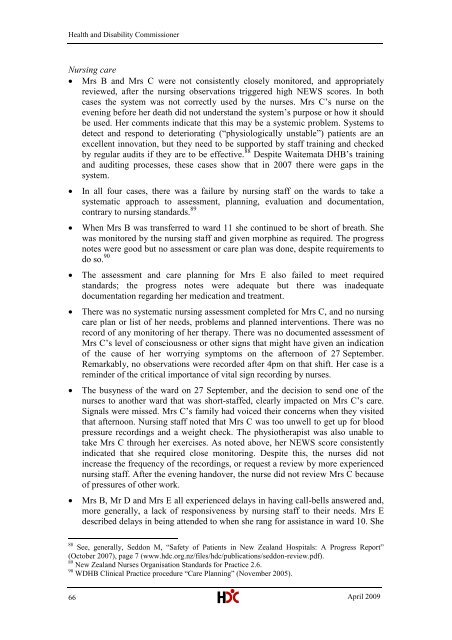North Shore Hospital report - New Zealand Doctor
North Shore Hospital report - New Zealand Doctor
North Shore Hospital report - New Zealand Doctor
You also want an ePaper? Increase the reach of your titles
YUMPU automatically turns print PDFs into web optimized ePapers that Google loves.
Health and Disability CommissionerNursing care Mrs B and Mrs C were not consistently closely monitored, and appropriatelyreviewed, after the nursing observations triggered high NEWS scores. In bothcases the system was not correctly used by the nurses. Mrs C‘s nurse on theevening before her death did not understand the system‘s purpose or how it shouldbe used. Her comments indicate that this may be a systemic problem. Systems todetect and respond to deteriorating (―physiologically unstable‖) patients are anexcellent innovation, but they need to be supported by staff training and checkedby regular audits if they are to be effective. 88 Despite Waitemata DHB‘s trainingand auditing processes, these cases show that in 2007 there were gaps in thesystem.In all four cases, there was a failure by nursing staff on the wards to take asystematic approach to assessment, planning, evaluation and documentation,contrary to nursing standards. 89When Mrs B was transferred to ward 11 she continued to be short of breath. Shewas monitored by the nursing staff and given morphine as required. The progressnotes were good but no assessment or care plan was done, despite requirements todo so. 90The assessment and care planning for Mrs E also failed to meet requiredstandards; the progress notes were adequate but there was inadequatedocumentation regarding her medication and treatment.There was no systematic nursing assessment completed for Mrs C, and no nursingcare plan or list of her needs, problems and planned interventions. There was norecord of any monitoring of her therapy. There was no documented assessment ofMrs C‘s level of consciousness or other signs that might have given an indicationof the cause of her worrying symptoms on the afternoon of 27 September.Remarkably, no observations were recorded after 4pm on that shift. Her case is areminder of the critical importance of vital sign recording by nurses.The busyness of the ward on 27 September, and the decision to send one of thenurses to another ward that was short-staffed, clearly impacted on Mrs C‘s care.Signals were missed. Mrs C‘s family had voiced their concerns when they visitedthat afternoon. Nursing staff noted that Mrs C was too unwell to get up for bloodpressure recordings and a weight check. The physiotherapist was also unable totake Mrs C through her exercises. As noted above, her NEWS score consistentlyindicated that she required close monitoring. Despite this, the nurses did notincrease the frequency of the recordings, or request a review by more experiencednursing staff. After the evening handover, the nurse did not review Mrs C becauseof pressures of other work.Mrs B, Mr D and Mrs E all experienced delays in having call-bells answered and,more generally, a lack of responsiveness by nursing staff to their needs. Mrs Edescribed delays in being attended to when she rang for assistance in ward 10. She88 See, generally, Seddon M, ―Safety of Patients in <strong>New</strong> <strong>Zealand</strong> <strong>Hospital</strong>s: A Progress Report‖(October 2007), page 7 (www.hdc.org.nz/files/hdc/publications/seddon-review.pdf).89 <strong>New</strong> <strong>Zealand</strong> Nurses Organisation Standards for Practice 2.6.90 WDHB Clinical Practice procedure ―Care Planning‖ (November 2005).66April 2009
















